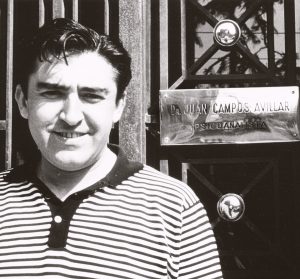The country as a group
To re-emigrate to the country of origin is difficult and more so when the changes are from a group environment with mainly democratic ways of functioning to paternalistic and authoritarian group relations of a dictatorship, all be it in the seventies on the verge of coming to an end.
Juan Campos is well aware of the differences between the countries in which he trained and the country to which he returns with the hope of sharing the groupanalytic and democratic way of functioning he had experienced. As if it was a plea for help, in 1970 with his well thought through paper of “Psychiatry and Society: The case of Spain”[1], still under the dictatorship of Franco, he runs the risk of addressing himself to his psychiatrist colleagues at the Hillside Hospital in New York, the city where he had trained, to tell them about the situation he had returned to. In the introduction he considers that:
“Spain or any other country has the kind of political organization that best fits with its social and psychological structure. Regardless of how strong the internal pressures are, a political change does not occur unless a previous social change has taken place. This change will always be the result of a dialectic process between the renewing or so called revolutionary forces and the conservative ones. All societies are continuously subject to this kind of processes and the way a given society is able to deal with this inner struggle and conflict shows its degree of social maturity. The greater the capacity a given society has to allow change, without losing the sense of social identity, the greater is its degree of maturity.”
In his final conclusions, as if explaining the reasons for addressing his colleagues with this paper, he states:
“For anybody wanting to work in a setting that is not his own, or from which he has been separated for an extended period of time, it is recommendable to try to assess the actual state of affairs, to then try to see the historical determinants which have lead to the present situation, to attempt to weigh the dynamic forces at play, and to foresee what possible developments are likely to take place and to clarify for himself the role he is to assume in order to secure that his contribution will foster development in the direction he thinks is desirable and realistically possible.
If one is committed to the idea that scientific thinking is more desirable than wishful thinking, one should be submitting oneself to a process of self-scrutiny in reference to one’s own personal incongruences and the cultural process one is part of. That gives one a chance to continue to be scientific in his thinking and behavior.”
A decade later, in 1981 he addresses himself to his groupanalyst colleagues in the pages of GAIPAC with his reflections about the “State of Group Analysis in Catalonia and Spain”[2]. Although he points out that “[t]otalitarian states do not gladly accept psychoanalysis and still less… group analysis on group analytic lines”, he is optimistic about the changes taking place in Spain, contemplating them within the various changes and processes taking place on the professional level in this country and the general changes in questions of training in Europe. He considers the Spanish groupanalytic development integrated in the European one, stating tongue in cheek: “I do not think that we Spaniards are going to be “converted” to group analysis. However, I do think that group analysis is a safe environment where group psychotherapeutic ideas with an analytical orientation can finally be introduced in Spain, —adding that— many things will be said in Spanish and some of it… will be worth hearing”.
These two reflections made by Juan Campos correspond to a stretch of time of over fifteen years of putting into practice his personal groupanalytic point of view in various contexts. In a large general hospital for children he creates a Service of Child and Family Psychiatry with three principal objectives: Setting up a multidisciplinary team of health care with in-service training and eventual economic autonomy; responding to and coordinating objectives with the other medical services of the hospital; and investigating responding to the needs of the social environment. Amongst the many presentations and papers[3], written testimony in English is his paper on the “Joint Treatment of Schizophrenic Children and their Mothers in a Group” presented at the 6th International Congress of Psychotherapy in London in 1964[4].
[1] 1970, J. Campos, Psychiatry and Society: The Case of Spain . Conferencia en el Hillside Hospital, New York, Easter 1970
[2] 1981, J. Campos, State of Group Analysis in Catalonia and Spain, GAIPAC
[3] 1963, J. Campos, Current Tendencies in Group Psychotherapy (Tendencias actuales en psicoterapia de grupo). Bilingual document

